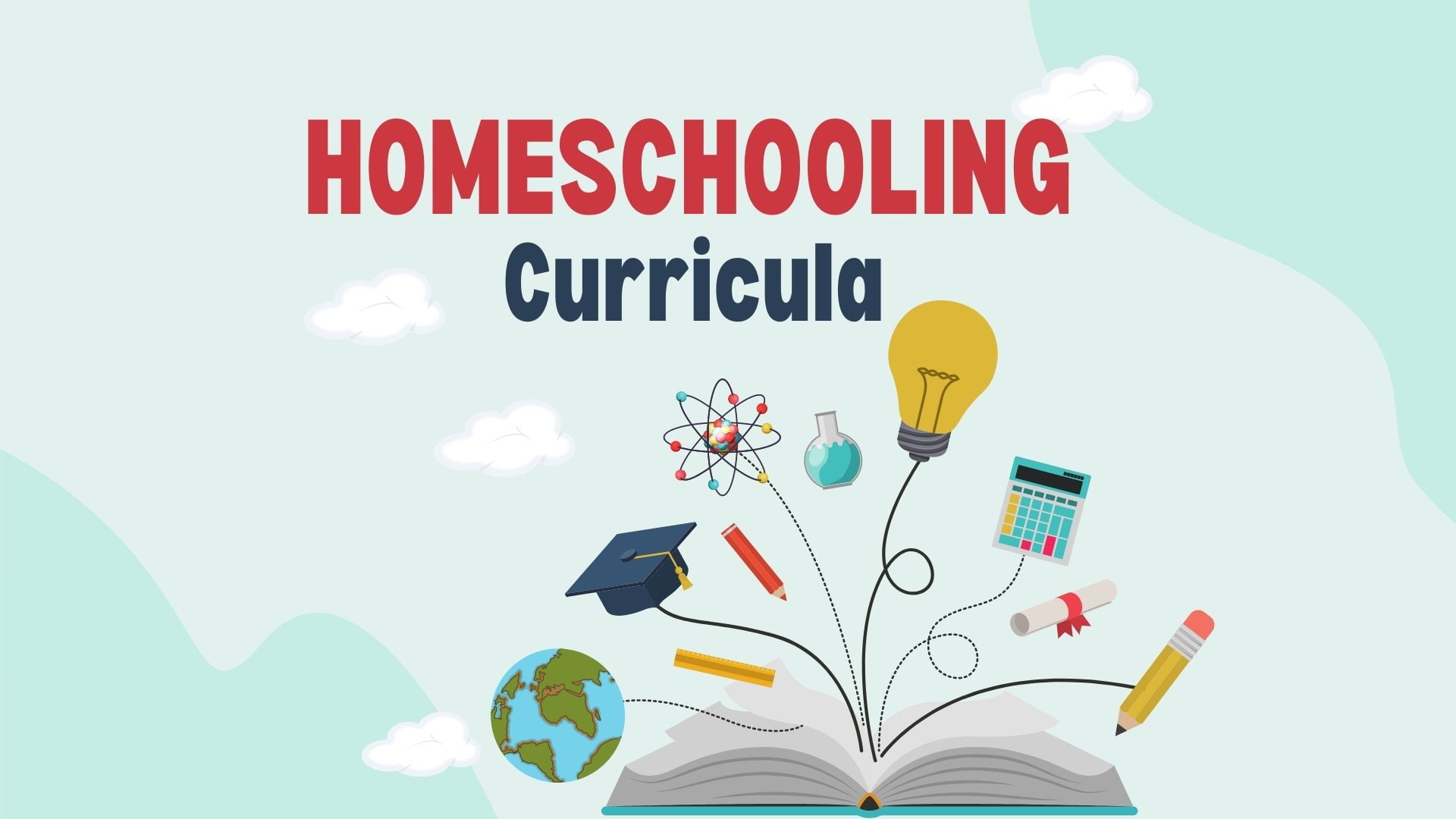Homeschooling Curricula: How To Create the Right Program for Your Child
Are you considering homeschooling your child? Choosing the right homeschooling curricula is one of the most important decisions you will make when starting your homeschooling journey. With so many options available, it can be overwhelming to know where to start. However, with a little research and careful consideration, you can find a curriculum that meets your child’s needs and fits your teaching style.
The homeschooling curriculum you choose will impact your child’s education and your daily routine. It is important to choose a curriculum that aligns with your child’s learning style and interests, as well as your educational goals for your child. Some families prefer a structured, textbook-based curriculum, while others prefer a more hands-on, project-based approach. When selecting a curriculum, you may also want to consider your child’s age, grade level, and future educational plans. With so many options available, it is important to take the time to research and compare different curricula to find the best fit for your family.
Why Homeschooling Curricula is Important
When it comes to homeschooling, choosing the right curriculum is crucial for the success of your child’s education. Here are three reasons why homeschooling curricula is important:
Flexibility
One of the biggest advantages of homeschooling is the flexibility it provides. When you choose your own curriculum, you can adjust it to fit your child’s learning style and pace. You can also create a schedule that works for your family’s lifestyle. For example, if your child is a night owl, you can adjust their schedule to allow them to do their schoolwork in the evening. With homeschooling curricula, you have the freedom to create a learning environment that works best for your child.
Control Over Curriculum
Another advantage of homeschooling curricula is the control it gives you over what your child learns. You can choose the topics and subjects that are most important to you and your family. You can also choose the level of rigor for each subject. For example, if your child is particularly interested in science, you can choose a science curriculum that is more advanced than what they would learn in a traditional school setting. With homeschooling curricula, you have the ability to tailor your child’s education to their individual needs.
Customization
Homeschooling curricula also allow for customization. You can choose from a variety of curricula and mix and match to create a program that works best for your child. For example, you can choose a math curriculum from one publisher and a language arts curriculum from another. You can also supplement your child’s education with electives that are not offered in traditional schools, such as music or art. With homeschooling curricula, you have the ability to create a unique and personalized education for your child.
In summary, homeschooling curricula is important because it provides flexibility, control over curriculum, and customization. When you choose the right curriculum for your child, you can create a learning environment tailored to their needs and interests.
Choosing the Right Homeschooling Curriculum
Choosing the right curriculum can be daunting when it comes to homeschooling. With so many options available, it can be challenging to determine which one will work best for your family. Here are some factors to consider when choosing the right homeschooling curriculum for your family:
Core vs. Elective Subjects
First, you will want to consider which subjects you want to cover in your homeschooling curriculum. Depending on your state or country, certain subjects must be included in a traditional schooling and homeschooling environment. These core subjects typically include math, science, language arts, and social studies. Elective subjects, on the other hand, are optional and can include subjects such as art, music, and foreign languages.
Online Curriculum vs. Textbooks
Another factor to consider is whether you want to use an online curriculum or textbooks. Online curricula can be more convenient and offer more interactive learning experiences, while textbooks can provide a more traditional learning experience. Consider your family’s learning style and preferences when making this decision.
Self-Paced Learning
Self-paced learning can be a great option for families with busy schedules or those who want more flexibility in their homeschooling curriculum. Many online curricula offer self-paced learning, allowing students to work at their own pace and on their own schedule.
High-Quality Curriculum
When choosing a homeschooling curriculum, it’s important to choose a high-quality one. Look for curricula that have been reviewed and recommended by other homeschooling families or organizations. You can also look for curricula that have been accredited by educational institutions.
Supplemental Resources
Finally, consider using supplemental resources to enhance your homeschooling curriculum. These can include educational games, field trips, and hands-on activities. Supplemental resources can help make learning more engaging and fun for your children.
In summary, choosing the right homeschooling curriculum requires careful consideration of factors such as core vs. elective subjects, online curriculum vs. textbooks, self-paced learning, high-quality curriculum, and supplemental resources. By taking the time to research and choose the right curriculum, you can provide your children with a high-quality education that meets their unique needs and learning styles.

Popular Homeschooling Curricula
If you’re looking for a popular homeschooling curriculum, you have plenty of options to choose from. Here are some of the most popular homeschooling curricula.
Book Shark
Book Shark is a literature-based homeschooling curriculum that emphasizes reading and writing. It offers programs for kids from kindergarten through high school. The curriculum is designed to be flexible, so you can adjust it to fit your child’s learning style.
Abeka
Abeka is a Christian-based homeschooling curriculum that offers programs for kids from preschool through high school. It focuses on traditional teaching methods and emphasizes memorization and repetition. Abeka offers a wide range of subjects, including math, science, history, and language arts.
Time4Learning
Time4Learning is an online homeschooling curriculum offering programs for preschool through high school kids. It includes interactive lessons, quizzes, and tests. Time4Learning offers a wide range of subjects, including math, science, language arts, and social studies.
Apologia
Apologia is a Christian-based homeschooling curriculum that offers programs for kids from kindergarten through high school. It focuses on science and offers a wide range of subjects, including biology, chemistry, physics, and astronomy. Apologia emphasizes hands-on experiments and real-world applications.
Saxon Math
Saxon Math is a homeschooling curriculum that offers programs for kids from kindergarten through high school. It emphasizes a mastery approach to math and includes plenty of practice problems. Saxon Math offers a wide range of subjects, including algebra, geometry, and calculus.
Oak Meadow
Oak Meadow is a Waldorf-inspired homeschooling curriculum that offers programs for kids from kindergarten through high school. It emphasizes creativity, imagination, and hands-on learning. Oak Meadow offers a wide range of subjects, including math, science, language arts, and social studies.
Khan Academy
Khan Academy is a free online homeschooling curriculum that offers programs for kids from kindergarten through high school. It includes interactive lessons, quizzes, and tests. Khan Academy offers a wide range of subjects, including math, science, history, and language arts.
No matter which homeschooling curriculum you choose, make sure it fits your child’s learning style and your family’s needs. Consider your child’s interests, strengths, and weaknesses when selecting a curriculum. You can help your child succeed in their homeschooling journey with the right curriculum.
Homeschooling Co-Ops and Support Groups
Homeschooling can be a rewarding experience, but it can also be challenging. One way to make homeschooling more manageable is by joining a homeschooling co-op or support group. These groups provide a sense of community and support and opportunities for socialization, field trips, and group classes.
Benefits of Co-Ops and Support Groups
Joining a homeschooling co-op or support group can provide many benefits for both parents and children. Some of the benefits include:
- Community: Co-ops and support groups offer a sense of community and belonging. You can connect with other homeschooling families who share your values and goals.
- Support: Homeschooling can be isolating, but co-ops and support groups offer a support system. You can get advice, encouragement, and resources from other homeschooling parents.
- Socialization: Co-ops and support groups offer opportunities for socialization. Children can make friends and participate in group activities.
- Group Classes: Some co-ops offer group classes, which can provide a break for parents and a chance for children to learn from other adults.
- Field Trips: Co-ops and support groups often organize field trips, which can be a fun and educational way to explore your community.
Finding a Co-Op or Support Group
If you’re interested in joining a homeschooling co-op or support group, there are several ways to find one:
- Online: You can search for co-ops and support groups online. Websites like Homeschool World and Homeschooling in California offer directories of homeschooling groups.
- Local Homeschooling Organizations: Local homeschooling organizations often have information about co-ops and support groups in your area. The California Homeschool Network is one such organization.
- Ask Other Homeschooling Parents: If you know other homeschooling parents, ask them if they belong to a co-op or support group. They may be able to recommend one.
Before joining a co-op or support group, it’s important to do your research. Make sure the group aligns with your values and goals and that it’s a good fit for your family.
Online Support Groups
If you’re unable to find a local co-op or support group, or if you prefer online communication, many online support groups are available. These groups offer a way to connect with other homeschooling parents and get advice and support. Some popular online support groups include:
- Homeschooling on a Shoestring: This Facebook group is focused on homeschooling on a budget.
- Secular Homeschooling: This online community is for families who homeschool without a religious affiliation.
- The Homeschool Lounge: This online forum offers a place for homeschooling parents to connect and share resources.
Online support groups can be a great way to connect with other homeschooling families, but it’s important to be cautious about sharing personal information online.
Homeschooling Curriculum Reviews
When it comes to choosing a homeschooling curriculum, it’s important to do your research. One of the best ways to learn about a curriculum is to read reviews from other homeschoolers who have used it. In this section, we’ll cover where to find reviews, how to evaluate them, and some common themes you may see in reviews.
Where to Find Reviews
There are several places where you can find homeschool curriculum reviews. Here are a few options:
- Homeschooling blogs: Many homeschooling bloggers share their experiences with different curricula. Look for blogs that are specific to your child’s age range or learning style.
- Homeschooling forums: There are several online forums where homeschoolers can connect and share information. Some popular ones include Homeschool.com and The Well-Trained Mind.
- Curriculum review sites: There are several websites that specialize in homeschool curriculum reviews, such as Cathy Duffy Reviews and The Homeschool Mom.
How to Evaluate Reviews
When reading reviews, it’s important to keep a few things in mind:
- Look for reviews from people with a similar teaching style or philosophy. What works for one family may not work for another.
- Consider the age and learning style of your child. A curriculum that works well for one child may not work for another.
- Be wary of reviews that seem overly positive or negative. Look for reviews that are balanced and provide specific examples of what worked well and what didn’t.
Common Themes in Reviews
As you read reviews, you may notice some common themes. Here are a few things you may see mentioned:
- Ease of use: Many homeschoolers appreciate curricula that are easy to use and require minimal prep time.
- Flexibility: Homeschoolers often value curricula that allow them to customize the learning experience for their child.
- Cost: Homeschooling can be expensive, so many families look for affordable curricula.
- Effectiveness: Ultimately, the most important factor is whether a curriculum is effective in helping your child learn and grow.
In conclusion, reading reviews can be valuable when choosing a homeschooling curriculum. By keeping these tips in mind and doing your research, you can find a curriculum that works well for your family.
Homeschooling Curriculum Resources
Selecting the right curriculum can make all the difference when it comes to homeschooling. Fortunately, there are many resources available to help you find the perfect fit for your family. Here are some of the most popular homeschooling curriculum resources to consider:
Lesson Plans and Unit Studies
Lesson plans and unit studies are a great way to organize your homeschooling curriculum. They provide a structured approach to learning and can be tailored to suit your child’s individual needs. Some popular lesson plan and unit study resources include:
Video Lessons
Video lessons can be a great supplement to your homeschooling curriculum. They can provide a visual and interactive way for your child to learn. Some popular video lesson resources include:
Tablets and Laptops
Tablets and laptops can be an excellent tool for homeschooling. They offer a portable and convenient way to access educational resources. Some popular tablet and laptop resources include:
- Apple iPad
- Microsoft Surface
- Chromebook
- Kindle Fire
Field Trips and Library Resources
Field trips and library resources can be a great way to enhance your homeschooling curriculum. They provide hands-on learning experiences and access to a wealth of educational materials. Some popular field trips and library resources include:
- National Park Service
- Smithsonian Learning Lab
- Library of Congress
- Your local library
Tutors and Online Tutoring
Tutors and online tutoring can provide personalized support and guidance for your homeschooling curriculum. They can help your child stay on track and overcome any challenges they may face. Some popular tutor and online tutoring resources include:
Remember, there is no one-size-fits-all approach to homeschooling. Finding the curriculum resources that work best for you and your child is important. With these popular resources, you’ll be well on your way to creating a successful homeschooling experience.
Homeschooling Curriculum for Specific Subject Areas
When it comes to homeschooling curricula, you have many options available to you. One of the first decisions you will need to make is whether you want to use a pre-packaged curriculum or create your own. If you choose to create your curriculum, you must select resources for each subject area. Here are some ideas for curricula for specific subject areas:
Language Arts
Language Arts is a broad subject area that includes reading, writing, grammar, and vocabulary. There are many resources available for homeschoolers, including textbooks, workbooks, and online courses. Some popular language arts curricula include:
- The Good and the Beautiful Language Arts – This curriculum is designed to be used for students in grades K-12. It includes literature, writing, grammar, spelling, and phonics.
- Brave Writer – This curriculum is designed to help students develop their writing skills. It includes writing prompts, grammar exercises, and literature studies.
- Easy Grammar – This curriculum is designed to help students master grammar. It includes workbooks and online courses.
Science
Science is another subject area that homeschoolers can approach in a variety of ways. Some popular science curricula include:
- Apologia – This curriculum is designed to be used for students in grades K-12. It includes textbooks, workbooks, and online courses. Topics covered include biology, chemistry, physics, and earth science.
- Real Science 4 Kids – This curriculum is designed to be used for students in grades K-8. It includes textbooks and workbooks. Topics covered include biology, chemistry, physics, and earth science.
- Exploring Creation with – This curriculum is designed to be used for students in grades 6-12. It includes textbooks and workbooks. Topics covered include biology, chemistry, physics, and earth science.
Social Studies
Social Studies is a subject area that includes history, geography, and civics. Some popular social studies curricula include:
- The Story of the World – This curriculum is designed to be used for students in grades K-12. It includes textbooks and workbooks. Topics covered include ancient, medieval, modern, and American history.
- Mystery of History – This curriculum is designed to be used for students in grades K-12. It includes textbooks and workbooks. Topics covered include ancient, medieval, modern, and American history.
- Notgrass History – This curriculum is designed to be used for students in grades K-12. It includes textbooks and workbooks. Topics covered include American history, world history, and government.
Music and Art
Music and Art are important subjects that can help students develop their creativity and self-expression. Some popular music and art curricula include:
- Artistic Pursuits – This curriculum is designed to be used for students in grades K-12. It includes textbooks and workbooks. Topics covered include drawing, painting, sculpture, and art appreciation.
- SQUILT Music – This curriculum is designed to be used for students in grades K-12. It includes textbooks and workbooks. Topics covered include music appreciation, composers, and music theory.
- Zeezok Music and Art History – This curriculum is designed to be used for students in grades K-12. It includes textbooks and workbooks. Topics covered include music history, art history, and composers.
Computer Programming
Computer Programming is a subject area that is becoming increasingly important in today’s digital age. Some popular computer programming curricula include:
- Code.org – This curriculum is designed to be used for students in grades K-12. It includes online courses and tutorials. Topics covered include coding basics, web development, and computer science.
- Scratch – This curriculum is designed to be used for students in grades K-12. It includes online courses and tutorials. Topics covered include coding basics and game development.
- Codeacademy – This curriculum is designed to be used for students in grades K-12. It includes online courses and tutorials. Topics covered include web development, data science, and computer science.
Advanced Placement Courses
Advanced Placement (AP) courses are college-level courses that can help students earn college credit while still in high school. Some popular AP curricula include:
- AP Homeschoolers – This curriculum is designed to be used for students in grades 9-12. It includes textbooks, workbooks, and online courses. Topics covered include calculus, biology, chemistry, physics, and more.
- The Great Courses – This curriculum is designed to be used for students in grades 9-12. It includes online courses and lectures. Topics covered include history, literature, science, and more.
- Khan Academy – This curriculum is designed to be
Standardized Testing and Accreditation for Homeschooling Curricula
As a homeschooling parent, ensuring your child receives a quality education is paramount. One way to do this is through standardized testing and accreditation. This section will discuss why standardized testing is important, how to obtain accreditation for homeschooling curricula, and how to prepare for standardized testing.
Why Standardized Testing is Important
Standardized testing is important because it objectively measures your child’s academic progress and helps identify areas where they may need additional support. Additionally, many states require homeschooling parents to administer standardized tests to their children in order to comply with state regulations.
Standardized tests are also useful for evaluating the effectiveness of your homeschooling curriculum and identifying areas where improvements can be made. By comparing your child’s scores to national averages, you can see how well they are performing relative to their peers.
Accreditation for Homeschooling Curricula
Accreditation is a process by which a third-party organization evaluates a homeschooling curriculum to ensure that it meets certain educational standards. Accreditation can provide homeschooling parents with additional credibility and recognition, which can be useful when applying to colleges or universities.
One option for obtaining accreditation is through The Academy of Home Education (AHE). AHE offers accreditation for homeschooling curricula for students in grades 1-12. To become accredited, you must submit an application for your student, have them take standardized and cognitive abilities tests (depending on grade level), and pay application and administrative fees.
Preparing for Standardized Testing
Preparing for standardized testing can help ensure that your child performs to the best of their abilities. Here are some tips for preparing for standardized testing:
- Familiarize yourself with the test format and content.
- Practice test-taking strategies, such as time management and the process of elimination.
- Review material that your child may be struggling with.
- Encourage your child to get a good night’s sleep and eat a healthy breakfast on the day of the test.
In conclusion, standardized testing and accreditation can be valuable tools for homeschooling parents to ensure their children receive a quality education. By understanding the importance of standardized testing, obtaining accreditation, and preparing for tests, you can help your child succeed academically.
Conclusion
When it comes to homeschooling, choosing the right curriculum is crucial for the success of your child’s education. With so many options available, deciding which program to use can be overwhelming. In this section, we will explore some of the most frequently asked questions about homeschooling curricula to help you make an informed decision.
What is the best homeschool program?
There is no one-size-fits-all answer to this question. The best homeschool program for your child will depend on their learning style, interests, and academic goals. Some popular options include online programs, textbooks, and unit studies. To determine which program is right for your child, consider their strengths and weaknesses and your teaching style.
How do you structure homeschooling?
Homeschooling can be structured in a variety of ways. Some families prefer a traditional school schedule, while others prefer a more flexible approach. It’s important to establish a routine that works for your family and allows for a balance between academic and extracurricular activities. Consider creating a daily or weekly schedule that includes time for core subjects, as well as time for breaks and other activities.
How do I choose a curriculum?
Choosing a curriculum can be daunting, but several factors must be considered. Some important considerations include your child’s learning style, academic goals, and your teaching style. Look for a curriculum that aligns with your values and provides a comprehensive education in all core subjects. You may also want to consider each program’s cost and time commitment.
Where is homeschooling most popular?
Homeschooling is becoming increasingly popular around the world, but it is most common in the United States. According to recent studies, there are approximately 2.5 million homeschooled students in the United States. Homeschooling is also legal in many other countries, including Canada, Australia, and the United Kingdom.
What is the best school curriculum in the world?
This question has no definitive answer, as the best curriculum will depend on your child’s needs and goals. However, some of the most highly regarded curricula include the International Baccalaureate (IB), Cambridge International Examinations (CIE), and Advanced Placement (AP) programs. These programs offer rigorous academic standards and are recognized by universities around the world.
In conclusion, choosing the right homeschooling curriculum is essential for your child’s academic success. By considering your child’s needs and goals, as well as your teaching style, you can choose a program that provides a comprehensive education and prepares them for their future.







